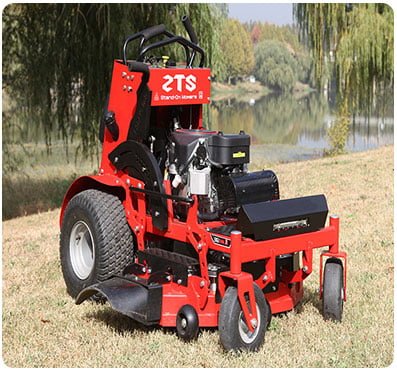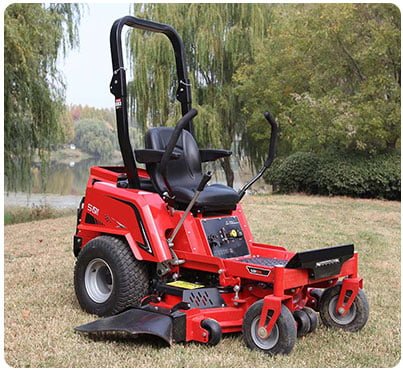Zero turn mower is renowned for their efficiency, speed, and maneuverability, making them a popular choice for both residential and commercial lawn care. However, despite their many advantages, there are situations where purchasing a zero-turn mower may not be the best decision. This article will explore various scenarios where opting for a different type of mower might be more practical and cost-effective.
Understanding Zero Turn Mower
Zero-turn mower is designed with a unique steering mechanism that allows them to turn on a dime, thanks to their independent wheel motors. This makes them highly efficient for mowing large, flat areas with lots of obstacles such as trees and flower beds. However, their specialized design also comes with certain limitations that may not suit every lawn care situation.
Limited Effectiveness on Steep Slopes
One of the most significant drawbacks of zero-turn mowers is their performance on steep slopes. Here’s why:
- Stability Issues: Zero-turn mowers have a high center of gravity, which makes them susceptible to tipping over when used on inclines greater than 15 degrees. This poses a significant safety risk to the operator.
- Traction Problems: The independent wheel motors can struggle to maintain traction on steep or uneven terrain. This can lead to slipping or loss of control, especially in wet conditions.
- Difficulty in Maneuvering: While zero-turn mowers are excellent for tight spaces on flat ground, their maneuverability can become a disadvantage on slopes, where precise control is harder to maintain.


Unsuitability for Small Lawns
Zero turn mower is designed for efficiency over large areas. For small lawns, their benefits diminish significantly:
- Overkill for Small Spaces: The speed and cutting width of zero-turn mowers can be excessive for small yards, leading to over-mowing and potential turf damage.
- Manoeuvrability in Tight Spaces: While zero-turn mowers can navigate around obstacles, they may still be too large to maneuver effectively in very tight or confined spaces typical of small lawns.
- Cost Inefficiency: Zero-turn mowers tend to be more expensive than other types of mowers. For small lawns, this higher investment may not be justified given the limited use.
High Initial and Maintenance Costs
Another consideration is the cost associated with zero turn mower:
- Higher Purchase Price: Zero-turn mowers are generally more expensive upfront compared to traditional push mowers or lawn tractors. This can be a significant investment, especially for homeowners with smaller or less complex lawns.
- Maintenance Costs: Zero-turn mowers require regular maintenance to keep their hydraulic systems and engines in good working condition. The cost of maintenance, including parts and labor, can be higher than that of simpler mower models.
- Fuel Consumption: Zero-turn mowers often consume more fuel due to their powerful engines, which can increase the long-term operational costs.
Limited Versatility
Zero turn mower is highly specialized machine designed primarily for mowing grass. Their versatility is limited in comparison to other types of lawn equipment:
- Lack of Attachments: Unlike lawn tractors, which can be fitted with various attachments such as snow blowers, trailers, and aerators, zero turn mower is generally limited to mowing tasks.
- Single-Purpose Use: If you need a machine that can perform multiple lawn care tasks, a lawn tractor or garden tractor might be a more versatile and cost-effective choice.
Difficult Learning Curve for Beginners
Operating a zero turn mower requires a certain level of skill and experience:
- Complex Controls: The dual-lever steering system of zero-turn mowers can be challenging for beginners to master. This can lead to difficulties in achieving a consistent cut and increased risk of accidents.
- Time to Learn: It takes time to become proficient in operating a zero-turn mower. For those who are not willing to invest this time, a simpler mower might be a better option.
Noise and Environmental Concerns
Zero turn mower can also be louder and less environmentally friendly:
- Noise Levels: The powerful engines of zero-turn mowers can produce higher noise levels, which might be a concern in residential areas with noise restrictions.
- Emissions: These mowers tend to have higher emissions compared to electric or battery-powered mowers, which can be a consideration for environmentally conscious consumers.
Conclusion
While zero-turn mowers offer significant advantages for certain mowing tasks, they are not suitable for every situation. Steep slopes, small lawns, high costs, limited versatility, a steep learning curve, and environmental concerns are all factors that might make a zero-turn mower an impractical choice. Before investing in a zero-turn mower, it’s crucial to carefully assess your specific lawn care needs and consider whether a different type of mower might be more appropriate. By doing so, you can ensure that you choose the right equipment to maintain a beautiful and healthy lawn effectively and safely.
Please leave a message if there is anything confused or visit official website of lawn mower if you are interesting.